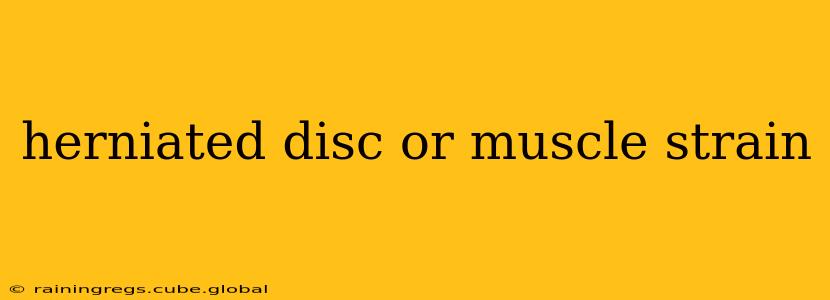Back pain is a common ailment, affecting millions worldwide. Two frequent causes are herniated discs and muscle strains. While both can cause significant discomfort, understanding the differences is crucial for proper diagnosis and treatment. This article will delve into the distinctions between these conditions, helping you better understand your back pain and navigate the path to recovery.
What is a Herniated Disc?
A herniated disc, also known as a slipped or ruptured disc, occurs when the soft, gel-like center of an intervertebral disc pushes through a tear in the tough outer layer. These discs act as cushions between the vertebrae in your spine. When one herniates, it can press on nearby nerves, causing pain, numbness, tingling, or weakness that radiates down the leg (sciatica) or arm. The location of the herniation determines the specific symptoms experienced.
What Causes a Herniated Disc?
Herniated discs are often the result of gradual wear and tear on the spine, particularly with age. However, sudden injuries, like lifting heavy objects improperly, can also trigger a herniation. Other contributing factors include:
- Genetics: A family history of disc problems can increase your risk.
- Obesity: Excess weight puts extra strain on the spine.
- Repetitive movements: Certain jobs or activities that involve repeated bending or twisting can contribute to disc damage.
- Poor posture: Maintaining poor posture weakens the back muscles and increases stress on the discs.
What is a Muscle Strain?
A muscle strain, also called a pulled muscle, is an injury to a muscle or tendon. Back muscle strains often occur due to overstretching or tearing of the muscle fibers. This can result in pain, stiffness, and limited range of motion in the back. Unlike a herniated disc, muscle strains typically don't cause radiating pain down the limbs.
What Causes a Muscle Strain?
Muscle strains in the back are commonly caused by:
- Sudden movements: Lifting heavy objects incorrectly, twisting awkwardly, or engaging in strenuous physical activity without proper warm-up can strain back muscles.
- Overexertion: Pushing your muscles too hard, especially without adequate conditioning.
- Poor posture: Similar to herniated discs, poor posture weakens the muscles and makes them more prone to injury.
- Dehydration: Dehydrated muscles are more susceptible to injury.
Herniated Disc vs. Muscle Strain: Key Differences
| Feature | Herniated Disc | Muscle Strain |
|---|---|---|
| Cause | Disc rupture, wear and tear | Muscle overstretching or tearing |
| Pain | Can be severe, radiating down leg or arm (sciatica) | Localized pain, stiffness, limited range of motion |
| Numbness/Tingling | Common | Uncommon |
| Weakness | Can occur | Less common |
| Diagnosis | MRI, CT scan, physical exam | Physical exam, sometimes imaging |
| Treatment | Pain management, physical therapy, surgery (in severe cases) | Rest, ice, pain relievers, physical therapy |
How are Herniated Discs and Muscle Strains Diagnosed?
Diagnosing these conditions usually involves a thorough physical examination by a doctor or physical therapist. They will assess your symptoms, range of motion, and neurological function. Imaging tests, such as MRI or CT scans, may be ordered to confirm the diagnosis, particularly for suspected herniated discs. X-rays are less helpful in diagnosing these specific conditions but can rule out fractures or other bony issues.
What are the Treatments for Herniated Discs and Muscle Strains?
Treatment for both conditions focuses on pain relief and restoring function. For muscle strains, rest, ice, over-the-counter pain relievers, and physical therapy are usually sufficient. Herniated discs may require more intensive management, potentially including medications for pain and inflammation, physical therapy to strengthen core muscles and improve posture, and in some severe cases, surgery.
Can a Muscle Strain Mimic a Herniated Disc?
Yes, the symptoms of a severe muscle strain can sometimes overlap with those of a herniated disc, making it challenging to distinguish between the two without proper medical evaluation. This is why a thorough examination by a healthcare professional is essential for accurate diagnosis.
How Long Does it Take to Recover from a Herniated Disc or Muscle Strain?
Recovery time varies greatly depending on the severity of the injury and the individual's response to treatment. Muscle strains often heal within a few weeks with appropriate care. Herniated discs can take several months or even longer to fully recover, depending on the extent of the damage and the treatment plan.
This information is for general knowledge and should not be considered medical advice. Always consult a healthcare professional for diagnosis and treatment of back pain.
